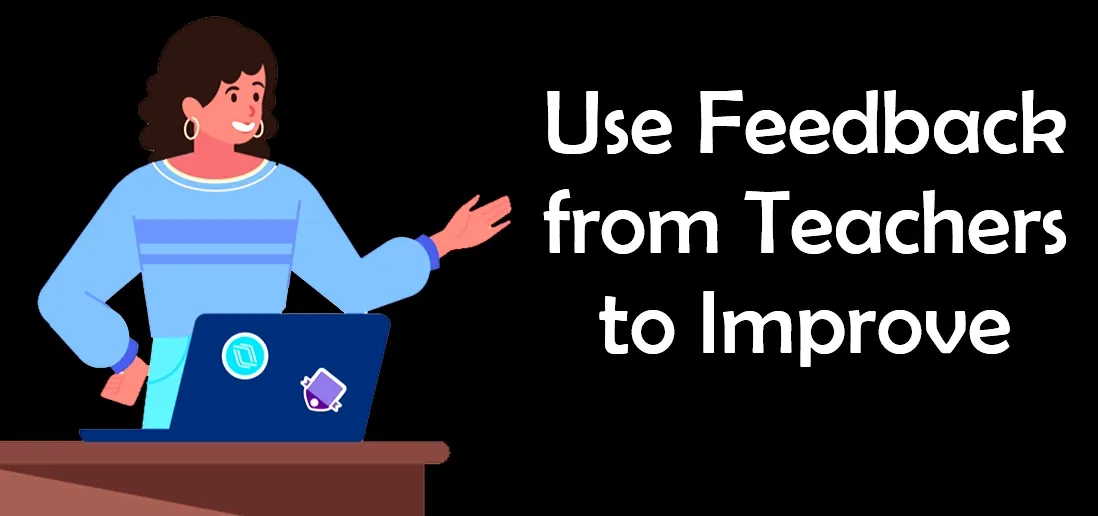How to Use Feedback from Teachers to Improve Academic Performance
Receiving feedback from teachers is an invaluable opportunity to enhance your learning and academic performance. Whether it's from assignments, tests, or general classroom interactions, constructive feedback provides insights into your strengths and areas for improvement. Here's how you can effectively use feedback to excel in your studies:
Understanding the Importance of Feedback
What is Feedback?
Feedback is information provided by teachers on your performance, highlighting what you did well and areas where you can improve. It aims to guide your learning process and help you achieve better results in future assessments. Feedback can come in various forms, such as written comments, verbal discussions, or even peer reviews. The primary goal is to offer constructive insights that enable you to refine your skills and knowledge.
Why is Feedback Important?
Feedback is crucial for several reasons:
Identifies Strengths and Weaknesses
Feedback helps you recognize your academic strengths and areas that need development. By understanding what you excel at, you can continue to build on those skills. Conversely, identifying weaknesses allows you to focus on improving specific aspects of your performance. This dual awareness fosters a more balanced and comprehensive approach to learning.
Promotes Growth
One of the key benefits of feedback is that it encourages continuous improvement. By focusing on specific aspects of your learning, feedback helps you set clear, actionable goals. This process of ongoing refinement and adjustment is essential for academic growth and success. For more tips on achieving academic growth, check out our article on Effective Study Techniques.
Enhances Understanding
Feedback clarifies concepts and expectations, improving your comprehension of the subject matter. When teachers provide detailed explanations of your mistakes or misunderstandings, you gain a clearer understanding of the topic. This deeper insight helps you avoid similar errors in the future and enhances your overall learning experience.
How to Effectively Use Feedback
1. Reflect on Feedback
Analyze and Understand
Take time to carefully read and understand the feedback provided by your teacher. Identify the key points regarding what you did well and areas that need improvement. Pay attention to specific comments or suggestions for enhancement.
Ask for Clarification
If any feedback is unclear or you need further explanation, don't hesitate to ask your teacher for clarification. Understanding the feedback fully is essential for implementing improvements effectively.
2. Set Goals for Improvement
Identify Actionable Steps
Based on the feedback received, outline specific actions you can take to address the areas for improvement. Break down larger goals into smaller, manageable tasks to track your progress effectively.
SMART Goals
Set SMART (Specific, Measurable, Achievable, Relevant, Time-bound) goals to ensure your objectives are clear and achievable. For example, if the feedback suggests improving essay structure, set a goal to practice outlining essays before writing.
3. Implement Changes
Apply Feedback in Practice
Actively incorporate the feedback into your study routine and assignments. Apply the suggested changes or strategies provided by your teacher to enhance your performance. For instance, if feedback suggests improving mathematical problem-solving techniques, practice more problems using the recommended approach.
Seek Additional Resources
Utilize additional learning resources, such as textbooks, online tutorials, or peer support, to reinforce your understanding and application of feedback-related improvements.
4. Monitor Progress
Track Your Performance
Regularly assess your progress towards achieving the goals set based on the feedback. Keep track of improvements in specific skills or subject areas to gauge your development over time.
Reflect on Changes
Reflect on how implementing feedback has impacted your academic performance. Note any challenges encountered and adjustments made to your study approach. This reflection helps refine your learning strategies further.
5. Seek Ongoing Feedback
Engage in Dialogue
Initiate discussions with your teacher to seek ongoing feedback on your progress. Share how you've applied previous feedback and inquire about areas that still need improvement. This dialogue demonstrates your commitment to learning and allows for continuous guidance.
Use Peer Feedback
Engage with peers to exchange feedback on assignments or study sessions. Peer perspectives can offer additional insights and alternative approaches to improving your academic work.
Conclusion
Effectively utilizing feedback from teachers involves active engagement, reflection, goal-setting, implementation of changes, and ongoing dialogue. By embracing feedback as a tool for growth and improvement, you can enhance your academic performance and achieve your learning objectives more effectively.
For more tips on academic success and learning strategies, visit Notes for SHS and explore our resources on study skills and exam preparation.
Related Posts
- Time Management During Exams
- How to Create Summarized Study Notes
- Effective Strategies for Take-Home Exams
- The Importance of Staying Positive During Exam Prep
- Strategies for Oral Exams
- How to Develop a Strong Thesis Statement
- Top Tips for Last-Minute Exam Prep
- Peer Support in Education
- How to Deal with Exam Anxiety
- Effective Study Techniques
- How to Create a Revision Timetable
- How to Use Mind Maps for Studying
- Top Study Apps for Students
- Stress Management Tips for Students
- How to Create a Revision Timetable

